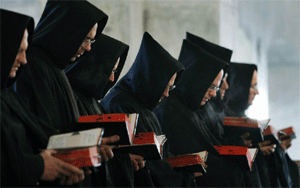The Catholic Church has always seen the contemplative life as the "Air Force" in its spiritual struggle, as the Rev. David Toups of the United States Conference of Catholic Bishops commented—a conduit of spiritual power. Though the number of young people entering monasteries, convents, and the priesthood has drastically dropped from the mid-20th century, some new approaches to religious vocations have inspired some young people in America to embrace this idea, replenishing several of the older religious orders and filling new ones. One such community with a young population, nestled in the Ozarks, is a place that could symbolize Catholicism's true hope for renewal in our time. Founded in 1999, the Clear Creek Monastery has grown from 13 to 30 monks who are intent on building a community that will "last for a thousand years."
For a time, the life of Catholic religious orders became about social justice issues, psychological issues, peace studies, interreligious dialogue, the ecology movement—everything and anything, seemingly, except the central proposition: that one can know a loving God and be transformed.
Russell Hittinger, the Warren professor of Catholic studies at the University of Tulsa, admits that many of those who entered religious life before Vatican II simply did not have a calling.
Those who truly have a call to monasticism—or other forms of the religious life—begin by falling in love with the pursuit of holiness, as did the monks of Clear Creek.
Indeed, a return to traditional practices is a common element among those religious orders experiencing renewal. Many young nuns, for example, choose to wear a traditional habit even when their older religious sisters choose modest secular fashions.
The emergence of Clear Creek and other growing monastic communities suggests there will always be young people who ask whether their devotion to God should take precedence over their own personal ambitions and even the natural desire for a family. (The A&E special God or the Girl was an insightful documentary about this.) Today's young people, who have grown up in a highly commercialized and manipulated landscape, are particularly eager to connect with a more authentic way of living. Far from being pressured into pursuing religious vocations, they find their families often protest, feeling they are losing their children to a life that's too isolated.
Father Anderson says, "We were only a bunch of bums, but by becoming nothing, you can be a part of something great."







